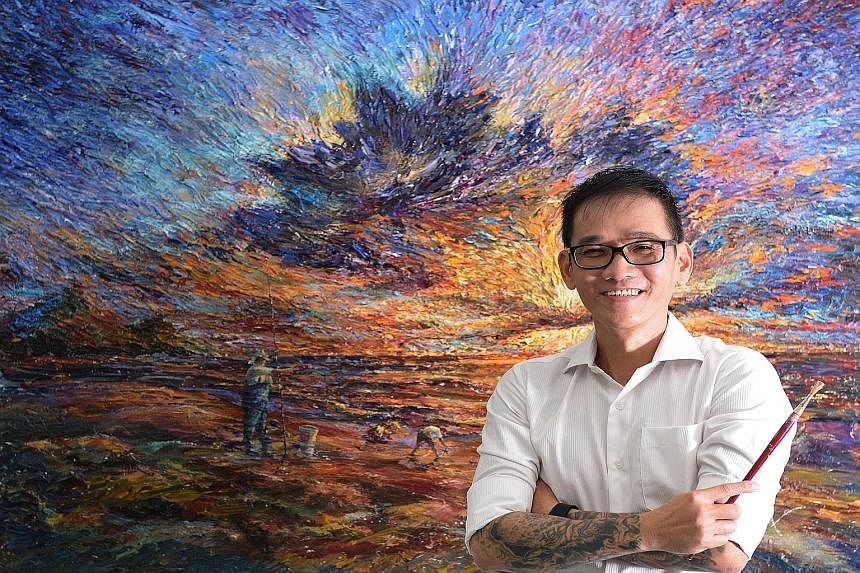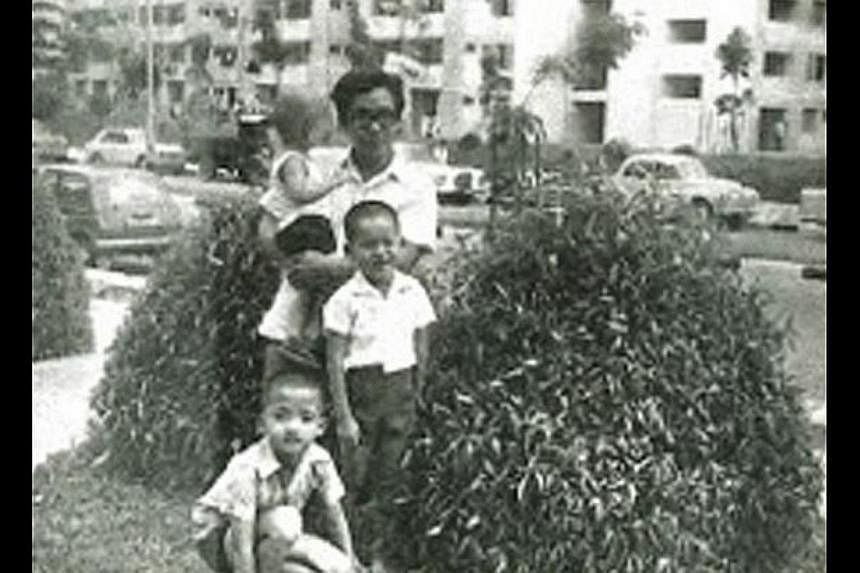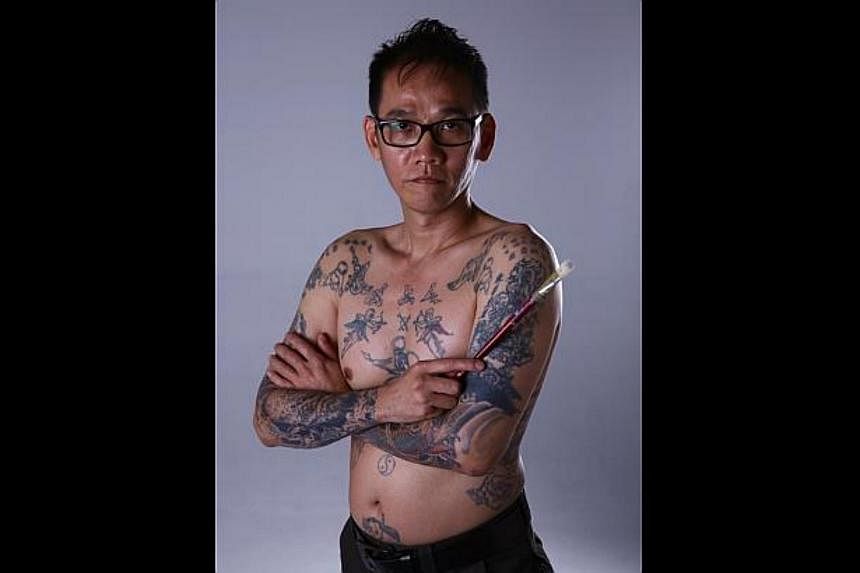On the night of Aug 15, 2008, Barry Yeow found himself in the lock-up of Bedok Police Station.
It was not his first brush with the law. His love for heroin and other types of narcotics had seen him thrown in jail and caned more times than he cared to remember.
This particular stint in the lock-up was the prelude to a court sentencing in which the former tattoo artist was expected to be given at least 10 years in the slammer, and possibly 24 strokes of the cane. In a drugged-out stupor, he had threatened a woman with a cutter blade and robbed her of her money and mobile phone.
The prospect of his sentence filled him with more than just dread; he felt really weary.
Then 41, he dropped to his knees and prayed for death.
"I didn't understand why my life was like that and why I couldn't change," he recalls.
A while later, he started showing symptoms of heroin withdrawal. He was taken to the prison hospital where the first thing he saw was a man in a vegetative state.
"Apparently, he tried to commit suicide in his cell. Someone saved him but got to him a little late. The lack of oxygen to the brain turned him into a vegetable," he says.
From a bed across the room, a drug addict he knew called out to him. The man had been arrested with more than 800g of heroin on him, a crime which would send him to the gallows.
Mr Yeow, now 48, does not know if his friend was executed or spared because of the 2011 moratorium to review the death penalty for drug offences. "But he definitely would not have a chance to come out," he says.
Other patients he saw jolted him. "Some people had to gasp for air just to swallow something. I looked at myself and I just had withdrawal symptoms, which were so minor. I realised that as long as I was breathing, I had hope," he says.
He was sentenced to 10 years and 12 strokes. While in prison this time, he picked up painting and it changed his life.
Mr Yeow won competitions organised by the Yellow Ribbon Project, the outfit dedicated to rehabilitating offenders and helping them reintegrate into society upon release. Soon he started getting commissions to paint for corporations and collectors.
Because of his good behaviour, he was released in April this year. Since then, he has been painting his heart out and, in the process, making a decent living.
"It's given me a lot of hope and connected me with a lot of people. That's why I am sitting here today, talking to you," he says with a quiet smile.
Decked out in a pair of nerdy glasses, the trimly built man is polite and self-deprecating. Except for the tattoos running down both his arms, there is little to suggest he has a past so wild it has kept him behind bars for more than 20 years.
He is the second of three sons of an oil rig supervisor, who died more than 10 years ago, and a factory worker.
"My father used to work in Saudi Arabia and we sometimes saw him once a year. My mother worked shifts in a factory," he says.
Home was a one-room rental flat in Toa Payoh. When he was 11 years old, his parents divorced.
"It's not an excuse but I think it affected me a lot," says the former pupil of Ai Tong Primary School.
A group of ruffians who befriended him turned him from a quiet and introverted kid into a rebellious one.
Barely two months after getting into Mayflower Secondary, he decided to quit his studies. The decision earned him a belting from his mother.
"I told my mother that I had already lost interest and that she shouldn't waste her time and money on me. I also told her not to hit me any more. I guess she was in depression then. She had to hold two jobs to feed the family; she couldn't handle me," he says.
"My father never got to talk to me because he was working overseas and trunk calls were very expensive in those days. By the time he came home for a visit, I was already smoking and had tattoos. He blamed himself."
He joined a gang and started disappearing from home often, sometimes for several weeks at a stretch. His paternal uncle tried to keep an eye on him by offering him a job as a carpentry apprentice but he preferred to hang out with members of a lion dance troupe, helping them to illegally hawk chestnuts and other food items at cinemas.
From them, he picked up glue sniffing.
"If I could sniff glue 24 hours a day, I would. It got so bad that my skin was almost jaundiced," says Mr Yeow, who soon got hauled up for gang activities.
As she could not control him, his mother sought help from social welfare officers who put him on a curfew and made him report to them regularly.
When he was 13, he got arrested for housebreaking after trying to break into a games arcade at the now defunct Wonderland Amusement Park in Kallang.
He got even wilder through his teens, and started extorting money and getting into gang fights. Stints in boys' homes and the Queenstown Remand Prison did not tame him.
"At that age, I thought life was an adventure. The wilder the roller-coaster ride, the better. My dad would come and visit me and cry and I would feel bad, but once I was back in the yard with other prisoners, I would forget all about it."
At 17, he was introduced to heroin by a friend's brother, a drug dealer. "He gave me the first dose for free. I remember it made me sick like hell," he says.
But boredom drove him to try it again, he says, and before long, he was hooked. His income from odd jobs such as masonry and carpentry could not help him sustain the habit, so he resorted to stealing.
By the time he reported to the Central Manpower Base for national service at 17, he had chalked up so many drug offences that he was hauled off immediately to the police station and sent to a drug rehabilitation centre (DRC).
During his time at the DRC, he picked up tattooing.
"The other inmates discovered I could draw, so I would draw the patterns for their tattoos," he says.
He was released after a year.
While waiting for his enlistment date, he and his childhood friend got into a motorcycle accident.
"I was supposed to go for a urine test that night. My friend had just got his motorbike licence that day and was anxious to use it so he offered to take me to my test," he recalls.
While trying to catch up with two other friends on another motorcycle, his friend lost control of the vehicle and hit a kerb.
Both of them were flung into the air. His friend hit a lamp post and died on the spot. Although Mr Yeow narrowly missed hitting a tree, he suffered heavy internal injuries.
The accident and his friend's death affected him badly and he went back to glue-sniffing and drugs while in the army.
His national service took more than six years to complete, interrupted by stints in the detention barracks and at the now-defunct Moon Crescent Prison for drug offences and threatening army officers with a parang.
Not long after he was discharged from the army at 26, he married a businesswoman. She was his younger brother's classmate and ran a company supplying workers to construction companies.
"I had known her for 13 years and she asked me to marry her," he says.
The marriage lasted four months. "I'm not proud to say this but I fooled around. I thought it was okay because she knew I was like that, but obviously it wasn't okay," he says.
After they divorced, he became a tattoo artist and set up his shop - Cyber Tattoos - in Katong. He also freelanced at studios in the Orchard and Bugis areas.
His skills got him quite a big pool of clients, including US marines.
"I specialised in free hand. I did not do any tracing. So when people came to me for a tattoo, they got something which was unique and special which they couldn't find
anywhere else," says Mr Yeow, who was especially good at tattooing images associated with the Occult.
He ran the business for 10 years and could earn more than $2,000 a day. But he spent it all on heroin and an assortment of other drugs - from Erimin to Subutex - which earned him a couple more stints behind bars.
One day in 2008, while trying to score a fix in Geylang, he committed his first robbery. He was so drugged out, he says, he did not realise he had robbed a woman from China.
"I woke up at night and wondered why I had a handphone and a stash of foreign currency on me," he says.
He was arrested a couple of weeks later. Apparently, his victim spotted him, tailed him and called the police.
And that was how he ended up that night in Bedok Police Station, praying for death.
Determined to turn over a new leaf, he started attending fellowship sessions and reading spiritual books while in jail. After winning an art competition organised by the Yellow Ribbon Project, he applied for and was selected for a painting course where his instructors included lecturers from LaSalle College of the Arts and Nanyang Academy of Fine Arts. Besides water colour and acrylics, he also learnt pottery, sculpting and batik painting.
He beefed up his knowledge by reading about artists and their works. "When I completed my first water-colour painting, my trainer offered to buy it. It was very encouraging for me. He told me it was not just the work, it was also the attitude I put into my art," he says.
During his six years in prison, he completed more than 500 commissions.
Determined to turn his life around, he approached his prison counsellor, Mr Dan Lim, to be his mentor upon his release.
Mr Lim, founder of Camwerkz, a camera equipment rental firm, agreed and even offered the use of his studios so Mr Yeow could continue painting. One of his art teachers in prison, Mr Ahmad Abu Bakar, offered to continue guiding him.
Mr Yeow, whose mother is thankful that he has made peace with himself, says art has given him a lot.
"I used to be really egotistical before. But in painting nature, I've realised I am so small. I've also learnt about colours and textures. In the past, I saw only one shade. I realise now there is more than one way to deal with things and issues," says Mr Yeow, who lives in a rented room in Yishun.
But more than anything else, he says, art has shown him there are many people - like Mr Lim and Mr Ahmad - who genuinely believe in second chances.
"So I tell myself I have to be grateful and live up to my part of the bargain. I too have to give myself a second chance."





